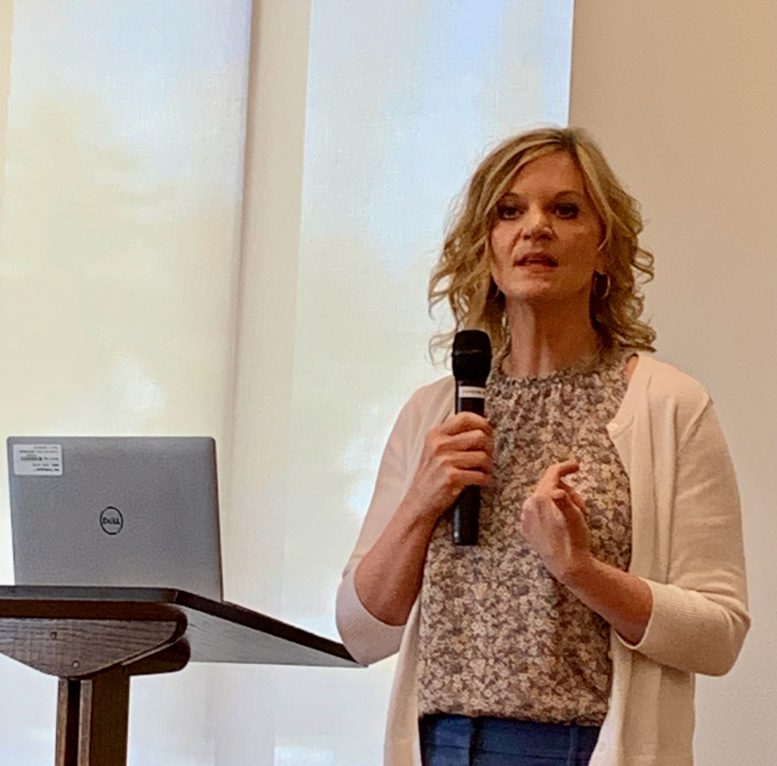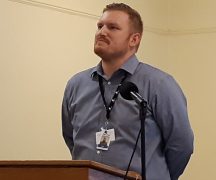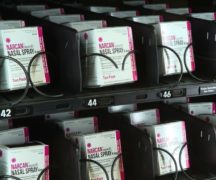By JULIE CARLE
BG Independent News
Unison Health’s crisis stabilization unit in Bowling Green is making a difference for adults experiencing a mental health crisis who may not need inpatient hospitalization.
The facility is not yet at full capacity, yet has still managed to average nearly 100 pre-screenings a month since January, Jennifer Emahiser, director of intensive services at Unison, reported Saturday during a meeting hosted by the Bowling Green League of Women Voters.
Before when the Unison mobile crisis team would go to Wood County Hospital in response to a crisis call, the individual most of the time would have to be transported to inpatient facilities, because there are no inpatient beds in the county. “Now about 50 percent of those individuals can come to the unit,” she said.
Emahiser estimated that of those 100 pre-screenings that are done each month, 60 would be put on a crisis plan and 40 would need hospitalization.
“Statistically, about 30 of the 40 people who were hospitalized would be appropriate for the crisis stabilization unit,” she said.
The mobile crisis team handles the unit’s admissions, responding within 30-60 minutes. Unlike hospitalization where admission is involuntary, the crisis stabilization unit requires individuals to sign in themselves, Emahiser said.
To date, approximately 25 percent of the 45 people who have been admitted are Bowling Green State University students. The average stay is three to seven days and up to 14, though “some are shorter, and some are longer,” she added.
The facility, which opened in January at 209 W. Poe Road, is one of only five crisis stabilization units in Ohio. Currently there are six available beds, with plans to double the number of beds once staffing numbers increase.
“Staffing is why we aren’t at full capacity, but we are doing the best we can. We are on the cusp of being able to offer more,” Emahiser said. “Crisis work is unique. Those who do it, love it. They are dedicated and great, but it’s not for everyone.”
Long-term plans for the crisis stabilization unit include a total of 12 beds for short-term inpatient care, four 23-hour observation beds (recliners), an outpatient services area at the back of the building, a police drop-off room and psychiatric urgent care.
The 23-hour observation option will be for individuals who are medically stable but under the influence, Emahiser explained. “Once they are no longer under the influence, we make sure they are medically stable and determine what level of care they need.”
The psychiatric urgent care will be able to provide a safe, stop-gap for people who may be suicidal or in a mental health crisis because they have gone off or run out of their medications and can’t get an appointment with their physician or a psychiatrist. The urgent care would provide access for evaluation by a psychiatrist or psychiatric nurse practitioner and speed up the process if medications are needed.
The drop-off room will facilitate a quicker, more efficient way for law enforcement officers to help a person who may be in crisis. Instead of waiting for Unison’s mobile crisis team, officers will be able to bring people to the unit and complete the process in about 10 minutes, Emahiser said.
Char Scherer, chair of the League’s mental health committee, said the need for a crisis stabilization unit became evident when the committee met with local law enforcement officers.
“When police responses (to mental health situations) were making the news, we asked the BG police chief, BGSU chief and sheriff how they dealt with crisis calls. We were pleased to find out they all work with mental health professionals on a regular basis and on many calls, the mental health professionals are on the scene,” Scherer said.
“We also found out that one of the greatest needs was a free-standing, community crisis center with beds for overnight and short-term housing for a person in crisis because Toledo hospital beds are usually full. We were heartened to hear about the new crisis stabilization unit,” Scherer added.
The Bowling Green League of Women Voters has a history of advocating for governmental and social reform, said Janet Parks, president of the BG League. “We believe that every U.S. resident should have access to a basic level of care, including mental health care. As a local league, we are committed to the continuing availability of mental health and substance abuse and addiction services for all. We also support sufficient funding of mental health services and acknowledge the increasing influence of addiction on the mental health of our residents.”
When a league member asked how Unison is funded, Emahiser was quick to point out that the crisis stabilization unit is a reality in Bowling Green thanks to the Wood County Alcohol, Drug Addiction and Mental Health Services Board’s commitment to providing necessary mental health services in the county.
While Unison does bill insurance for clients and receives state and federal grants, she said. “Wood County funding a big part of this. Without them, we wouldn’t be open.”
“The ADAMHS board is so important, and they do such amazing work in Wood County. If you need mental health treatment here, money is not a barrier to treatment,” added Bill Emahiser, director of public relations at Unison.
The best way to access the crisis stabilization unit or other crisis mental health services is to call the local crisis line at 419-502-HOPE (4673) or the national suicide and crisis hotline at 988.





